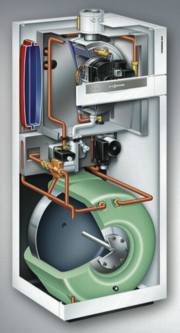Viessmann boilers have extra hot-water features

Integrated space heating and domestic hot water — the Vitodens 333 can recover 86 litres of hot water within 10 min.
Viessmann has enhanced the design of its combination boilers to improve their performance at supplying domestic hot water. To deliver small quantities of hot water quickly, the Vitodens 100 Plus 30 kW combination boiler has an internal circuit within the plate heat exchanger so that hot water is constantly available and can be on its way to a tap within seconds of draw-off. An option for the Vitodens 100 boiler includes an extension for the external portion of the flue to avoid pluming problems. New installation brackets are available to give space behind the boiler to run pipework vertically if top connections are required. To meet the requirements of customers who want lots of hot water while keeping the key system components in one casing is the Vitodens 333 condensing combi boiler. The casing houses a condensing boiler with an output of 26 kW and which delivers hot water through a plate heat exchanger into an integral 86 litre cylinder. Hot water is always available for several draw-off points. The full output of the boiler is diverted to hot water, which can be regenerated within 10 min. The stainless-steel heat exchanger is said to have a service life equalling or surpassing conventional boilers and an efficiency of up to 96%. The design of the heat exchanger enables the condensate to clean it as it passes through the boiler to the drain. The burner has a turndown ratio of 4:1. Its footprint of 580 x 600 mm enables this module to be fitted into a convenient corner.
Related links:


